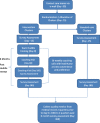Optimizing huddle engagement through leadership and problem-solving within primary care: A study protocol for a cluster randomized trial
- PMID: 30286798
- PMCID: PMC6172734
- DOI: 10.1186/s13063-018-2847-5
Optimizing huddle engagement through leadership and problem-solving within primary care: A study protocol for a cluster randomized trial
Abstract
Background: Team-based care has been identified as a key component in transforming primary care. An important factor in implementing team-based care is the requirement for teams to have daily huddles. During huddles, the care team, comprising physicians, nurses, and administrative staff, come together to discuss their daily schedules, track problems, and develop countermeasures to fix these problems. However, the impact of these huddles on staff burnout over time and patient outcomes are not clear. Further, there are challenges to implementing huddles in fast-paced primary care clinics. We will test whether the impact of a behavioral intervention of leadership training and problem-solving during the daily huddling process will result in higher consistent huddling in the intervention arm and result in higher team morale, reduced burnout, and improved patient outcomes.
Methods/design: We will conduct a care-team-level cluster randomized trial within primary care practices in two Midwestern states. The intervention will comprise a 1-day training retreat for leaders of primary care teams, biweekly sessions between huddle optimization coaches and members of the primary care teams, as well as coaching site visits at 30 and 100 days post intervention. This behavioral intervention will be compared to standard care, in which care teams have huddles without any support or training. Surveys of primary care team members will be administered at baseline (prior to training), 100 days (for the intervention arm only), and 180 days to assess team dynamics. The primary outcome of this trial will be team morale. Secondary outcomes will assess the impact of this intervention on clinician burnout, patient satisfaction, and quality of care.
Discussion: This trial will provide evidence on the impact of a behavioral intervention to implement huddles as a key component of team-based care models. Knowledge gained from this trial will be critical to broader deployment and successful implementation of team-based care models.
Trial registration: Clinicaltrials.gov , NCT03062670 . Registered on 23 February 2017.
Keywords: Huddle; Primary care; Team-based care; Training.
Conflict of interest statement
Ethics approval and consent to participate
IRB approval has been obtained from the lead coordinating center, the Mayo Clinic (approval number 16–010146) and from the two participating external sites. All participating clinicians must provide informed consent. All protocol modifications will be sent to the IRB for approval.
Consent for publication
Not applicable.
Competing interests
The authors declare that they have no competing interests.
Publisher’s Note
Springer Nature remains neutral with regard to jurisdictional claims in published maps and institutional affiliations.
References
-
- Shortell SM. A bold proposal for advancing population health. Discussion paper. Washington, DC: Institute of Medicine; 2013.
-
- Wagner et al. BMC Family Practice (2017) 18:13; DOI 10.1186/s12875-017-0590-8. - PubMed
Publication types
MeSH terms
Associated data
LinkOut - more resources
Full Text Sources
Medical


